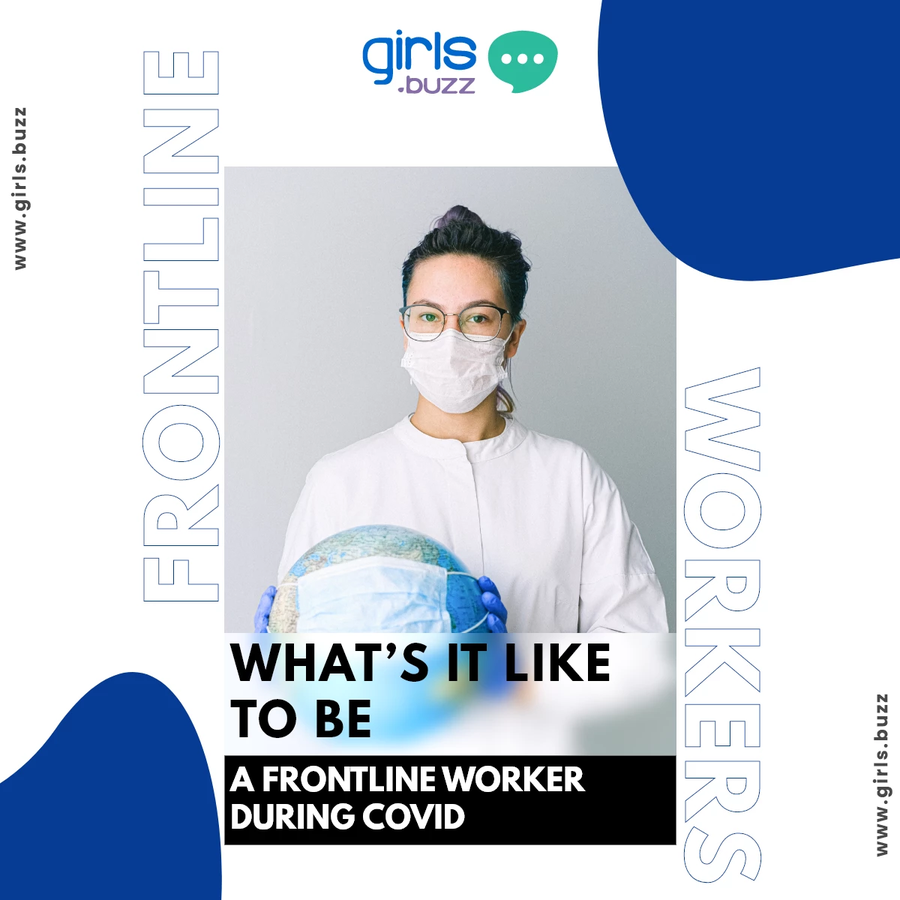What’s it Like to be a Frontline Worker during COVID?
5 minuteRead

In the year 2020, the COVID-19 pandemic worked its way through the country. Everyone would agree that it has disrupted the way we work, travel, shop and eat. It has been the biggest societal shift since the Second World War. Amidst these trying and unfortunate times, the world was introduced to a fairly new term – “Frontline Workers”. Who are these people? Why are they so important to the economy and society?
Well, frontline workers make a big portion of the overall global workforce. They are the key workers who are critical to the COVID-19 response. They are the people who are delivering essential public services within the country. They are at the frontline, and at the helm of health and social care. Doctors, nurses, ambulance drivers, police personnel, delivery executives, ASHA workers and flight attendants are all essential workers who are expected to go out when everyone else is expected to stay inside.
Frontline Workers: The Good, Bad & Ugly
For the common man, the lockdown might seem like a bane. Many people have even expressed that they’re stuck at home. You’d be shocked to know that a frontline worker would do anything to be at home with their family, aged parents or new born child. Sadly, this is a privilege they don’t enjoy. They go out every single day, provide their labour in person and are still on the job so that you and I can work from home. They too face the same level of risk of infection but their demanding jobs and socio-economically disadvantaged conditions force them to go out there so that we can enjoy a good night’s sleep. These are our frontline workers.
The next time you see a frontline worker, give them a shoutout. They deserve it. Your appreciation can go a long way in motivating them and putting a smile on their faces in these unprecedented times.
The frontline has been dealing with the pandemic head-on for over a year. That’s a year of facemasks, face shields, gloves, PPE kits and protective gear. They don’t just have to report to work with due diligence but also have to deal with angry customers. Despite facing severe health and job uncertainty, they’re out there serving people.
A delivery executive working with a well-known food-tech app told us how a few customers shout at him when the order is delivered late. Putting a customer’s wrath aside, they are still out there doing their job in the quest to find economic security. They’re too worried about making enough money to pay their house rent and feed their family.
On the other hand, the fatigue healthcare workers and doctors are facing is unimaginable. They are required to work round-the-clock and they are on their feet for nearly 12-16 hours at a stretch. A doctor we spoke to even said that nobody can imagine the discomfort a woman doctor/nurse faces while treating patients. They’re required to wear PPEs all day which is not just expensive but even prone to infection if taken out in-between shifts. During their period, things become worse when they’re bleeding heavily and suffering from body cramps. Despite all this, they still curb themselves from using the washroom. Some doctors are even facing heavy dehydration as they have reduced their daily water intake.
Despite these challenges, healthcare workers are doing their duty relentlessly. They are literally working outside their comfort zones and are exposed to such high levels of risk.
Impact of the Pandemic on Frontline Workers
Going to work during such times has put the physical, social and mental well-being of frontline workers at risk. Exposure to excessive stress is also hampering their health in the following ways:
- Burnout
Burnout is the most common mental health issue being experienced by our frontline workers. A lot of employees are experiencing emotional exhaustion, anxiety, depression, and a decreased sense of accomplishment which is affecting their overall productivity.
Frontline workers have also cited that a large part of their fatigue comes from systemic issues such as shortage of beds, oxygen concentrators and PPE kits. They also become victims of public anger when things go wrong. This new routine, increase in caseload and rolling out of new guidelines every now and then is having a major impact on their overall mental health. Besides the long working hours and staff shortage, frontline workers are victims of social issues too. Their family life is affected and they are outcasted by the society they live in as potential virus carriers.
- Childcare is a Concern
Another issue frontline parents are facing is addressing their childcare needs. With schools and day-care centres being closed, it has become a challenge especially for women who majorly bear the responsibility of a child in a marriage. They are required to work all-day and then take care of their child which is taking a major toll on their physical and mental health.
- Post-traumatic Stress Disorder (PTSD)
Driving patients to a hospital, treating them and seeing them succumb is triggering the onset of common mental disorders in ambulance drivers, doctors and crematorium workers respectively. They are experiencing high levels of depression and anxiety, and even post-traumatic stress disorder. Some of the factors that are inducing these mental health conditions include fatigue, long working hours, lack of rest and sleep, inadequate intake of food and drink, the uncertainties of the pandemic and unrealistic emotions. Constant bad news floating around and losing a loved one is leading these frontline workers to experience heightened anxiety, apprehension and stress. Not just them but their families too are worried about their safety as they are required to deal with critical COVID cases.
- Risk of Suicide
The suicide risk among healthcare and frontline workers has increased tenfold after the pandemic. Social isolation, financial distress and lack of support has heightened suicidal tendencies in frontline workers. All the negativity around them is taking a toll on their well-being and thereby forcing them to take untoward measures. Thus, the government has requested family members and friends to check on their loved ones during these stressful times.
- Resorting to Unhealthy Behaviours
Job stressors are leading frontline workers towards unhealthy behaviours such as tobacco use, alcohol and other substances. This is further turning into substance-use disorders. The addiction and burnout are making them drink due to which they are severely unproductive at work the next day.
The next time you’re plagued with the thought that you are “stuck at home”, think about our frontline workers. They’d do anything to be in your position right now. Every person from the medical fraternity, police force and food delivery space should be given the respect and passion they truly deserve. They are our superheroes who have been working tirelessly while neglecting their own needs.
We the team at Girls Buzz extend a heartfelt thank you and salute to every frontline worker out there.
Write, Record and Answer! Consume Unlimited Content! All you need to do is sign in and its absolutely free!
Continue with one click!!By signing up, you agree to our Terms and Conditions and Privacy Policy.










